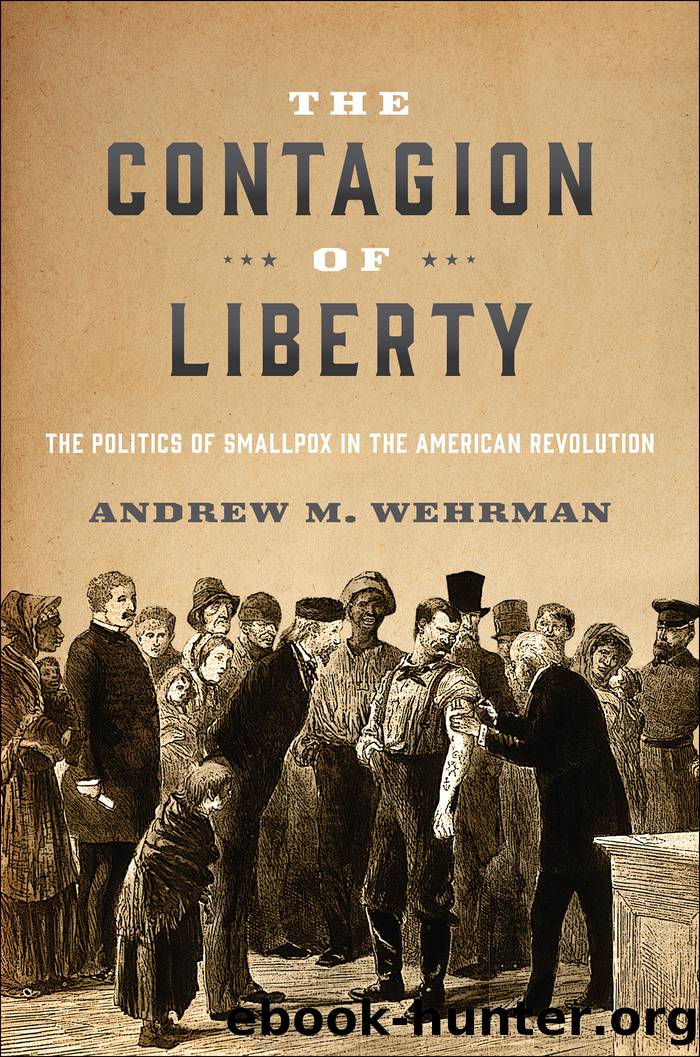The Contagion of Liberty by Andrew M. Wehrman

Author:Andrew M. Wehrman
Language: eng
Format: epub
Publisher: Johns Hopkins University Press
Published: 2022-06-15T00:00:00+00:00
* 8 *
THIRTEEN SCARS
George Washingtonâs order to inoculate the Continental army had vast implications beyond the military, as the battle against smallpox opened up a new front of the war, affecting men, women, and children as well as soldiers across the thirteen colonies. Health was foremost on the mind of John Walker, a neighbor and friend of Thomas Jeffersonâs, in the difficult summer of 1780. Walker was serving as a Virginia delegate to the Continental Congress, and Jefferson was then the governor of Virginia. Before discussing the news that General Horatio Gates was taking over in the Southern Department after the disastrous fall of Charleston to the British, Walker inquired about the health of Jeffersonâs family before sharing his own news. Walker had brought his family to Philadelphia and, like many of members of Congress, had needed to be inoculated on arrival. He reported that his family was âperfectly recoveredâ from the procedure. His wife, Elizabeth, amazingly experienced âonly two pustules,â and their teenaged daughter, Milly, had a more patriotic number of blemishes: âone for each of the United States.â1 Even if most Americans did not refer to their pock marks as battle scars, most knew that they could not win the war without them. Overcoming the dreaded disease was broadly understood to be a collective struggle and a crucial obstacle to be overcome as the war for independence stretched across the thirteen states before the victory at Yorktown in 1781.
For tens of thousands of civilians across the new United States, Washingtonâs order seemed to confirm that their government â whether local, state, or national â should protect public health by providing broad access to inoculation. Although the order was initially given in secret in February 1777, and technically affected only the Continental army, its impact was massive from New Hampshire to Georgia. Within months, Americans learned that General Washington supported public inoculations. The overturning of Connecticutâs inoculation ban was the most dramatic reversal, but across the new country and amid a war for independence, Americans had made their priorities clear by demanding momentous changes in public health. Now these priorities aligned with the commander and chief of the Continental army and with Congress. Military officials, state and local governments, and private doctors worked together and separately to implement the policy. Inoculating the Continental army and all its new recruits required the cooperation of soldiers, their families, and civilian governments. Many communities further organized to protect themselves. Some conducted general inoculations of whole populations as in Boston, and others focused on safety, price controls, and other measures to guarantee access for soldiers and civilians alike. These efforts were uneven across the colonies, especially in the South. Washington did not pressure southern governors to build inoculation hospitals as he had in the North. The ubiquity of slavery made many southerners more hesitant to inoculate, more hostile to broad inoculation efforts, and even angrier at the British, whom they blamed for purposely spreading the disease to both freed and enslaved Black populations of the South.
Download
This site does not store any files on its server. We only index and link to content provided by other sites. Please contact the content providers to delete copyright contents if any and email us, we'll remove relevant links or contents immediately.
Periodization Training for Sports by Tudor Bompa(8253)
Why We Sleep: Unlocking the Power of Sleep and Dreams by Matthew Walker(6706)
Paper Towns by Green John(5179)
The Immortal Life of Henrietta Lacks by Rebecca Skloot(4576)
The Sports Rules Book by Human Kinetics(4379)
Dynamic Alignment Through Imagery by Eric Franklin(4208)
ACSM's Complete Guide to Fitness & Health by ACSM(4057)
Kaplan MCAT Organic Chemistry Review: Created for MCAT 2015 (Kaplan Test Prep) by Kaplan(4008)
Introduction to Kinesiology by Shirl J. Hoffman(3766)
Livewired by David Eagleman(3764)
The Death of the Heart by Elizabeth Bowen(3610)
The River of Consciousness by Oliver Sacks(3599)
Alchemy and Alchemists by C. J. S. Thompson(3515)
Bad Pharma by Ben Goldacre(3422)
Descartes' Error by Antonio Damasio(3270)
The Emperor of All Maladies: A Biography of Cancer by Siddhartha Mukherjee(3148)
The Gene: An Intimate History by Siddhartha Mukherjee(3094)
The Fate of Rome: Climate, Disease, and the End of an Empire (The Princeton History of the Ancient World) by Kyle Harper(3055)
Kaplan MCAT Behavioral Sciences Review: Created for MCAT 2015 (Kaplan Test Prep) by Kaplan(2984)
